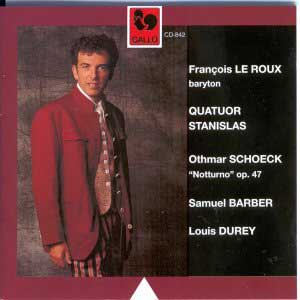We do not hear much about Gallo so let's start putting
that right. If you have any difficulty ordering their material a quick
search on the internet will take you straight to their site.
This warmly and intimately recorded connoisseur's collection
of songs for baritone and string quartet cuts a late romantic swathe
through the repertoire. It should appeal to those who have been fortunate
enough to discover and appreciate the latest Guild collection of Swiss
romantic songs. Since 43 of the disc's 55 minutes is taken up with Schoeck's
Notturno it is no surprise to see that the Schoeck Association
sponsored the recording and that Chris Walton (an outstanding writer
who keeps reminding me of the much missed Chris Palmer) contributes
the sleevenote as he also did for the Guild disc.
Schoeck has been pretty exhaustively covered as to
his lieder output by Jecklin-Disco. There are twelve volumes of songs
there which one day I would very much like to review. Schoeck is rarely
if ever given to joyous exuberance. He loves the shadowlands, lichen-hung
and fragrant with mould. These same realms are also haunted by Peter
Warlock as in ‘echtge of streams’ in his The Curlew and in various
works by Bernard van Dieren. The creepy presto comes close to
joy but it is a ghoulish joy. The score pushes at the extremes of tonality
in the direction of Berg. The poems are by Nikolaus Lenau (he whose
Lenore had provided Raff with inspiration for his Fifth Symphony
and Liszt for several of his tone poems). Gottfried Keller, another
constant among the several hundred Schoeck songs, provides the text
for the second half of the last song. Walton tells us that this fine
pessimistic song-cycle was written in recollection of an affair with
the Genevan pianist Mary Senger. A theme he associated with Mary is
used in his opera Venus (1919-21 recorded on MGB) and is quoted
at the words 'Der immer naht ...' Comfort is captured in the last song
which drifts in a summer nocturne with the same wispy nostalgia as in
his great string work Sommernacht.
I do wish one of the publishing houses would pick up
Chris Schoeck’s biography in English translation. It is currently only
in German.
The Barber song sets the words of Matthew Arnold. It
is highly romantic and much easier of access for listeners than the
Schoeck cycle. This has been recorded several times - classically by
Fischer-Dieskau and by the composer (both on Sony). I prefer Le Roux
over both and certainly over F-D who tends to a thickness of accent.
The singer here has English that is clean and clear through a voice
that has a touch of Gerald English's distinctive nasal quality.
The little daisy-chain of Louis Durey songs are to
words by Cocteau. These remind me a little of Warlock's childhood cycle
Lillygay. They are the least complex of the songs here. They
are folksy in a slightly tamed way and when you compare the Canteloube
settings of Basque songs (Maria Bayo on Naive) and Davrath's or Upshaw’s
Auvergnat songs on Vanguard or Warner it is to the advantage of Canteloube.
That said the song Attele (the last of the three) is a work with
much more depth. Durey is now the subject of a princely Hyperion anthology
on CDA67257 and the singer is none other than M. Le Roux.
The song texts are printed in original language only
- no translations.
Le Roux and the Stanislas Quartet are superb throughout
- so imaginative and fresh. They are well presented by the Gallo engineers.
Though I did wonder about closeness of balance at the start of the first
Schoeck song things soon settled down. I would certainly like to hear
the other Gallo CD of the Stanislas in Eisler-Weill-Schoenberg.
Rob Barnett


